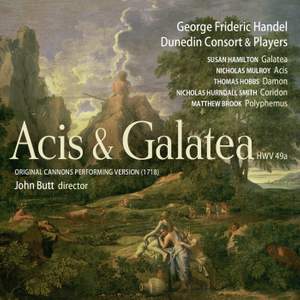Handel: Acis and Galatea
Susan Hamilton, Nicholas Mulroy, Thomas Hobbs, Nicholas Hurndall Smith & Matthew Brook
Dunedin Consort & Players, John Butt
The chief strength of this account lied in the excellent instrumental playing (the recorders that form the 'warbling choir' addressed in Galatea's first aria are sheer magic)… — More…
-
Gramophone MagazineJanuary 2009Disc of the Month
Downloads
What are FLAC and MP3?Contents
Handel: Acis and Galatea
Work length1:35:02
$29.00
$43.50
$59.45
- Nicholas Mulroy (soloist), Thomas Hobbs (soloist), Players, Matthew Brook (soloist), Nicholas Hurndall Smith (soloist), Susan Hamilton (soloist)
- The Dunedin Consort
- John Butt
- Recorded: 29 April - 02 May 2008
- Recording Venue: Greyfriars Kirk, Edinburgh, United Kingdom
1. Sinfonia
Track length3:12
$1.00
$1.50
$2.05
2. Chorus. Oh, the Pleasure of the Plains!
Track length6:13
$1.00
$1.50
$2.05
3. Accompagnato. Ye Verdant Plains and Woody Mountains (Galatea)
Track length0:45
$1.00
$1.50
$2.05








